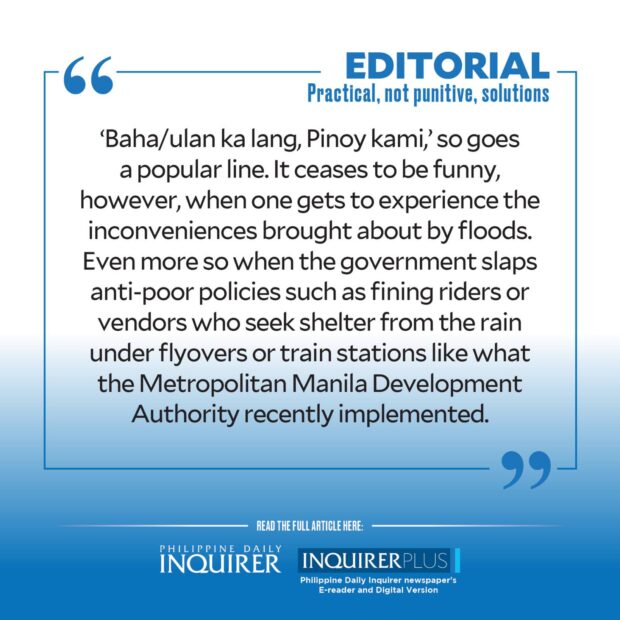Practical, not punitive, solutions

Scroll through the #raininginManila trend on social media platforms and one would see how Filipinos use humor to cope with disasters.
“Baha/ulan ka lang, Pinoy kami,” so goes a popular line. It ceases to be funny, however, when one gets to experience the inconveniences brought about by floods. Even more so when the government slaps anti-poor policies such as fining riders or vendors who seek shelter from the rain under flyovers or train stations like what the Metropolitan Manila Development Authority (MMDA) recently implemented.
MMDA announced that starting Aug. 1, it will issue traffic violation tickets to riders taking shelter under underpasses and flyovers during downpours and fine them P1,000 for obstruction. 1Rider Party List Rep. Bonifacio Bosita promptly criticized the policy calling it inhumane (“hindi makatao”) and even putting riders in danger. “Sa halip na tugunan nila ang problema, ilalagay pa nila sa peligro ang buhay ng mga ito at kokolektahan pa nila ng malaking halaga ng multa (Instead of finding a solution to the problem, they are putting the lives of riders in peril and even collecting a huge fine from them),” Bosita said.
MMDA said it has asked gasoline station operators to install tents, particularly in their Edsa stations, to serve as shelter for riders. This will force riders to continue on the road, despite the dangers, until they get to the nearest gas station. While it is valid for MMDA to be concerned about riders obstructing traffic or causing accidents, Bosita said there is actually space for temporary shelter under these structures without obstructing other motorists and pedestrians. The proposal also raises the question of MMDA passing the burden to private gasoline stations. It has billions in its budget so why can’t it build these temporary shelters for motorists along major thoroughfares instead? Must MMDA be reminded of its mandate to deliver metro-wide services including the management of transport, traffic, and public safety?
But, really, who is still surprised by so many anti-poor policies?
Just some examples: Requiring new driver’s license applicants to enroll in a driving school accredited with the Land Transportation Office that charges P5,000 and above, and for renewal applicants to pay P500 for a vision test. Imposing a dress code in government offices, in the process discriminating against those who cannot afford proper attire (the proposed Open Door Policy Act pending at the House of Representatives seeks to ensure that all citizens will have equal access to public service regardless of attire). Or how about forcing already hard-up drivers and operators to spend at least P2 million on an e-jeepney?
Then there’s the “rush hour surcharge” that seeks to help jeepney and bus drivers cope with the rising cost of fuel but will pose an additional burden to commuters.
The Land Transportation Franchising and Regulatory Board is reviewing a petition filed by transport groups last year to impose the surcharge in the face of another round of oil price hikes. Under the proposal, P1 will be added to the jeepney base fare and P2 to the city bus fare during the peak hours of 5 a.m.-8 a.m. and 4 p.m.-8 p.m. on weekdays and Saturdays.
But many have criticized the measure including Muntinlupa Mayor Ruffy Biazon, who posted on X (formerly Twitter): “Imagine the impact of this policy on the minimum wage worker. He has to wake up so early and go home late just to save on his transportation expense. He can’t leave home late or leave work late. How much rest is left for him?”
It also does not address the root of the problem: a broken public transport system.
Transport is a very touchy subject for the majority of Filipinos who go through the dehumanizing experience of trying to catch a ride to and from work with few public transport options and a lack of last-mile connectivity. The social media response to these policies ranges from frustration to disappointment: “Government officials should try commuting first.” “Why punish commuters and taxpayers?” Yet the government has so far offered only band-aid solutions that affect the marginalized sectors the most. If it’s going to impose a rush hour surcharge, why not impose it on all road users instead of passing it to commuters under the guise of helping jeepney and bus drivers? Smart cities like Singapore use electronic road pricing, a fully automated system that sets rates for drivers to use the road based on location, time of day, vehicle type, and real-time speeds to reduce traffic in traffic-prone areas. Other cities have also encouraged telecommuting or work-from-home set-ups. They also promote public transport and alternative options such as walking and cycling—a very practical solution in a country where only 6 percent own cars. But the government has focused on widening roads to accommodate more vehicles instead of creating a safe road environment for the 94 percent who do not own cars, take public transport, and walk or bike to work.
Why is the government always inclined to go for punitive measures instead of finding practical and lasting solutions that will make Filipinos’ lives better and easier?




















